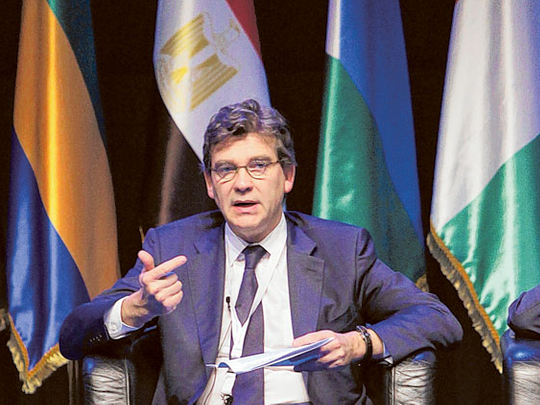
Dubai: While oil will remain the dominant energy force for decades to come, the new reality of green energy is slowly making inroads toward what some are estimating to be a $10 trillion (Dh36.7 trillion) industry that could someday outpace fossil fuels, say world foreign ministers gathered for World Energy Forum in Dubai.
With energy demands rising by 70 per cent within the next two decades globally, countries are scrambling to find not only green energy sources to balance the rising cost of petroleum but to also welcome green energies that generate sustainable economic growth.
Wind, solar, biomass, hydroelectric, geothermal – carbon neutral practices have an entirely new realm of economic fortunes to be had, say energy ministers as the world moves through one of the largest energy revolutions in human history.
Arnaud Montebourg, Minister of Productive Recovery, told delegates on Tuesday that France — and indeed the globe — are in the middle of a third energy revolution, followed by the original coal days of industrial revolution followed by a second revolution spurred on by oil and the automobile.
This third revolution is all about harnessing the tremendous potential of renewable energies and finding new economic paths that will generate newfound economic benefits and also create jobs, he said.
He said that France will someday be forced to deep-six its nuclear electrical generation as the country moves to more low-carbon footprint technologies.
“Such a revolution can’t take place on its own,” he said, noting that all players from producers to consumers will have to subscribe to the new future.
Thailand’s Minister of Energy, Arak Chonlatanon, said ensuring a “robust recovery depends on energy security” in the future, a mantra that requires a deep understanding of the current energy transitions now taking place as oil prospects become less attractive.
“Last year, my country spent $40 billion – or about 10 per cent of GDP — on energy,” Chonlatanon said, adding that his government is reaching toward a goal of implementing 25 per cent of energy production from renewable sources within the next decade.
Citing an example, he said that Thailand is hoping to work toward a target of the country using 39 million litres of gasohol (ethanol fuel) per day to reduce its reliance on traditional petroleum products.
Fatmir Mediu, Minister of Environment, Forestry and Water Administration, said, his country is working on ushering in new technologies to balance environmental and economic concerns.
“Challenges of today are to reconcile economic development with environmental protection,” he said.
One of the bigger challenges for Albania, said Mediu, is moving the country away from its traditional dependence on petroleum materials used to power generators that produce electricity for the country.
Currently, “over 95 per cent of electricity in our country comes from hydrocarbons,” he said.
Despite burning fossil fuels to keep the country turned on, he said that Albania ranks very well compared to its neighbours for its carbon emissions.
“Albania CO2 emissions are five times lower than the EU average,” he said.
The country is also pursuing other measures to recycle its waste to recapture lost revenues going into landfills, he said.










